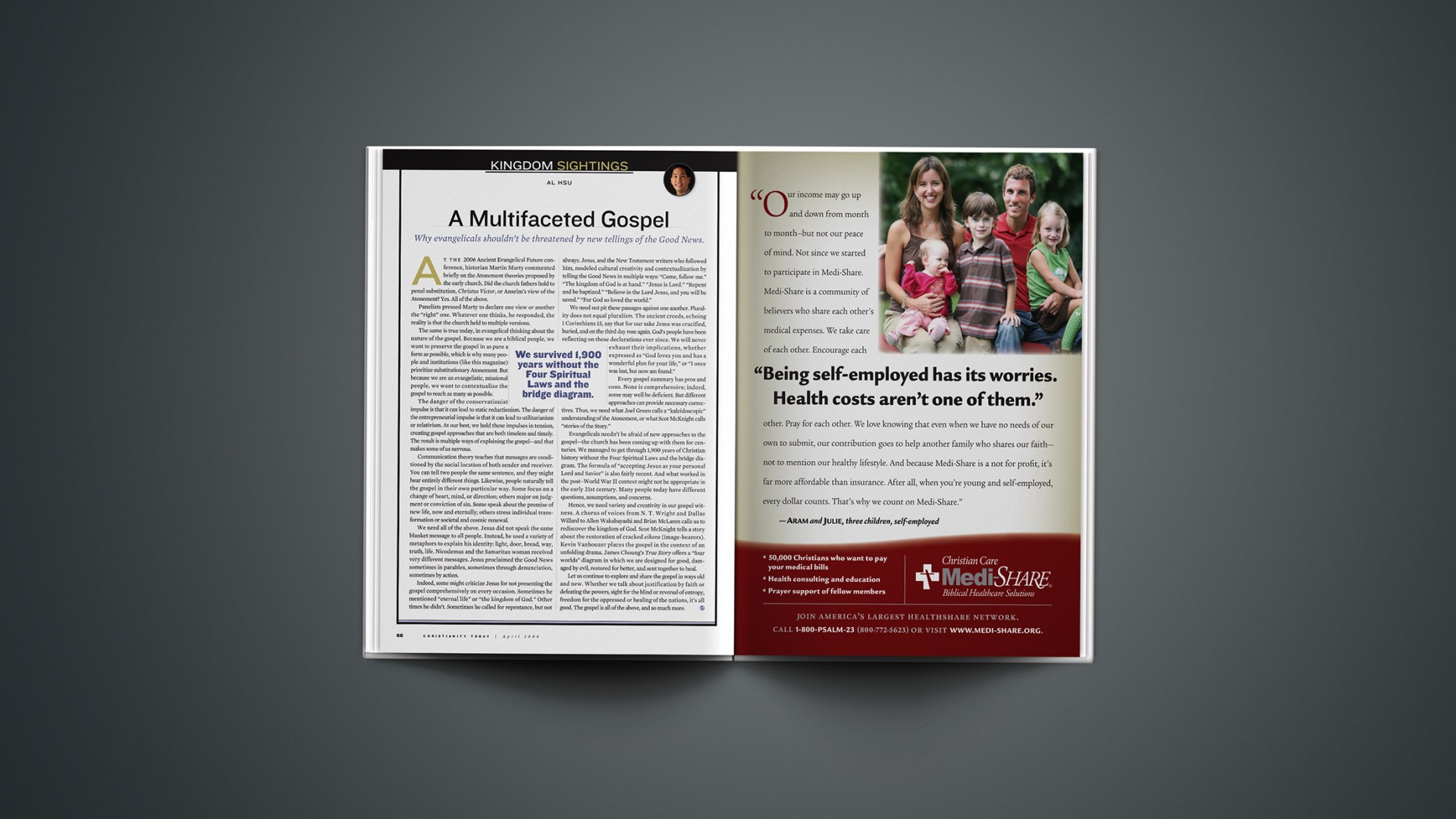At the 2006 Ancient Evangelical Future conference, historian Martin Marty commented briefly on the Atonement theories proposed by the early church. Did the church fathers hold to penal substitution, Christus Victor, or Anselm’s view of the Atonement? Yes. All of the above.
Panelists pressed Marty to declare one view or another the “right” one. Whatever one thinks, he responded, the reality is that the church held to multiple versions.
The same is true today, in evangelical thinking about the nature of the gospel. Because we are a biblical people, we want to preserve the gospel in as pure a form as possible, which is why many people and institutions (like this magazine) prioritize substitutionary Atonement. But because we are an evangelistic, missional people, we want to contextualize the gospel to reach as many as possible.
The danger of the conservationist impulse is that it can lead to static reductionism. The danger of the entrepreneurial impulse is that it can lead to utilitarianism or relativism. At our best, we hold these impulses in tension, creating gospel approaches that are both timeless and timely. The result is multiple ways of explaining the gospel—and that makes some of us nervous.
Communication theory teaches that messages are conditioned by the social location of both sender and receiver. You can tell two people the same sentence, and they might hear entirely different things. Likewise, people naturally tell the gospel in their own particular way. Some focus on a change of heart, mind, or direction; others major on judgment or conviction of sin. Some speak about the promise of new life, now and eternally; others stress individual transformation or societal and cosmic renewal.
We need all of the above. Jesus did not speak the same blanket message to all people. Instead, he used a variety of metaphors to explain his identity: light, door, bread, way, truth, life. Nicodemus and the Samaritan woman received very different messages. Jesus proclaimed the Good News sometimes in parables, sometimes through denunciation, sometimes by action.
Indeed, some might criticize Jesus for not presenting the gospel comprehensively on every occasion. Sometimes he mentioned “eternal life” or “the kingdom of God.” Other times he didn’t. Sometimes he called for repentance, but not always. Jesus, and the New Testament writers who followed him, modeled cultural creativity and contextualization by telling the Good News in multiple ways: “Come, follow me.” “The kingdom of God is at hand.” “Jesus is Lord.” “Repent and be baptized.” “Believe in the Lord Jesus, and you will be saved.” “For God so loved the world.”
We need not pit these passages against one another. Plurality does not equal pluralism. The ancient creeds, echoing 1 Corinthians 15, say that for our sake Jesus was crucified, buried, and on the third day rose again. God’s people have been reflecting on these declarations ever since. We will never exhaust their implications, whether expressed as “God loves you and has a wonderful plan for your life,” or “I once was lost, but now am found.”
Every gospel summary has pros and cons. None is comprehensive; indeed, some may well be deficient. But different approaches can provide necessary correctives. Thus, we need what Joel Green calls a “kaleidoscopic” understanding of the Atonement, or what Scot McKnight calls “stories of the Story.”
Evangelicals needn’t be afraid of new approaches to the gospel—the church has been coming up with them for centuries. We managed to get through 1,900 years of Christian history without the Four Spiritual Laws and the bridge diagram. The formula of “accepting Jesus as your personal Lord and Savior” is also fairly recent. And what worked in the post–World War II context might not be appropriate in the early 21st century. Many people today have different questions, assumptions, and concerns.
Hence, we need variety and creativity in our gospel witness. A chorus of voices from N. T. Wright and Dallas Willard to Allen Wakabayashi and Brian McLaren calls us to rediscover the kingdom of God. Scot McKnight tells a story about the restoration of cracked eikons (image-bearers). Kevin Vanhoozer places the gospel in the context of an unfolding drama. James Choung’s True Story offers a “four worlds” diagram in which we are designed for good, damaged by evil, restored for better, and sent together to heal.
Let us continue to explore and share the gospel in ways old and new. Whether we talk about justification by faith or defeating the powers, sight for the blind or reversal of entropy, freedom for the oppressed or healing of the nations, it’s all good. The gospel is all of the above, and so much more.
Copyright © 2008 Christianity Today. Click for reprint information.
Related Elsewhere:
Al Hsu (pronounced Shee) is an associate editor at InterVarsity Press. The author of several books, most recently The Suburban Christian, he blogs at TheSuburbanChristian.blogspot.com.
His earlier column was “The Vision Thing: Clarity came just as things got blurry.” He also wrote on the Harry Potter craze.










